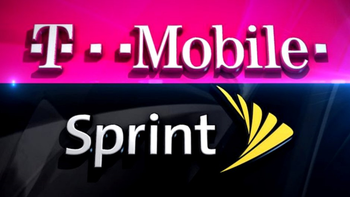DOJ and T-Mobile reportedly reach "rough agreement" on merger with Sprint

Approval from the Department of Justice (DOJ) is one of three remaining roadblocks preventing T-Mobile and Sprint from closing on their $26.5 billion merger that was first announced on April 29th, 2018. According to a report from CNBC, the DOJ has reached a "rough agreement" with T-Mobile; the regulatory agency will allow the merger to go through as long as T-Mobile and Sprint agree to help make Boost Mobile the fourth major U.S. carrier replacing Sprint. To win FCC approval for the transaction, T-Mobile already agreed to divest itself of the pre-paid wireless provider, freeze prices for three years following the close of the deal, and build out its 5G network to cover 97% of the U.S. over the same time period.
Because the DOJ is concerned with competition, it has focused on the 25% drop from four major U.S. carriers to three that would happen if the merger closes. That, the agency fears, would allow prices to rise throughout the industry. The theory is that by selling Boost Mobile and some spectrum to Dish Network for a rumored $6 billion, Boost would be able to keep Verizon, AT&T, and the New T-Mobile in check as far as pricing is concerned.
But the DOJ wants T-Mobile parent Deutsche Telekom to sweeten the pot to help convince Dish Chairman Charles Ergen to pull the trigger on the deal. The Justice Department wants T-Mobile to give Dish unlimited access to the carrier's network for an MVNO agreement. A mobile virtual network operator (MVNO) is one who offers cellular service to the public without owning the network being used. T-Mobile wants Dish's access limited to 12.5% of the carrier's network. As part of the agreement, Dish will have an MVNO agreement with the combined T-Mobile-Sprint for six or seven years before it will be forced to move to its own 5G network. This will cost Dish billions of dollars to build and the satellite content provider says that it would like to find a partner to share the costs. Dish does happen to be sitting on spectrum of its own that it will lose unless it is in use by next March.
DOJ and T-Mobile said to have reached a "rough agreement"
T-Mobile also is concerned that a company with deep pockets like Amazon (which itself has expressed some interest in buying Boost) and Google will make a huge investment in Dish and quickly ramp up Boost to challenge the New T-Mobile. To prevent this scenario from taking place, T-Mobile wants to limit any strategic investment in Dish to a 5% stake as part of an agreement with the DOJ.

CEOs Marcelo Claure and John Legere are getting closer to completing their long-awaited merger
Earlier today, CNBC's David Faber reported that the DOJ and T-Mobile had agreed on "a rough agreement" that would see Dish buy Boost Mobile and additional spectrum from the combined T-Mobile-Sprint. A revenue-sharing agreement is also said to be part of the deal.
Once the DOJ signs off, approval is still needed from the California Public Utilities Commission. And the last hurdle involves a lawsuit filed by 14 state attorneys general. The suit argues that the merger will lessen competition in the industry and raise prices, but it won't go to trial until October. Last month, there was a concern on the part of T-Mobile and Sprint that the judge in the case would issue a temporary restraining order preventing the merger from closing until the trial comes to an end. Both wireless providers already signed one extension that calls for a July 29th deadline to close on the merger. The previous deadline was set for April 28th. Both companies might need to sign another extension.










Things that are NOT allowed: